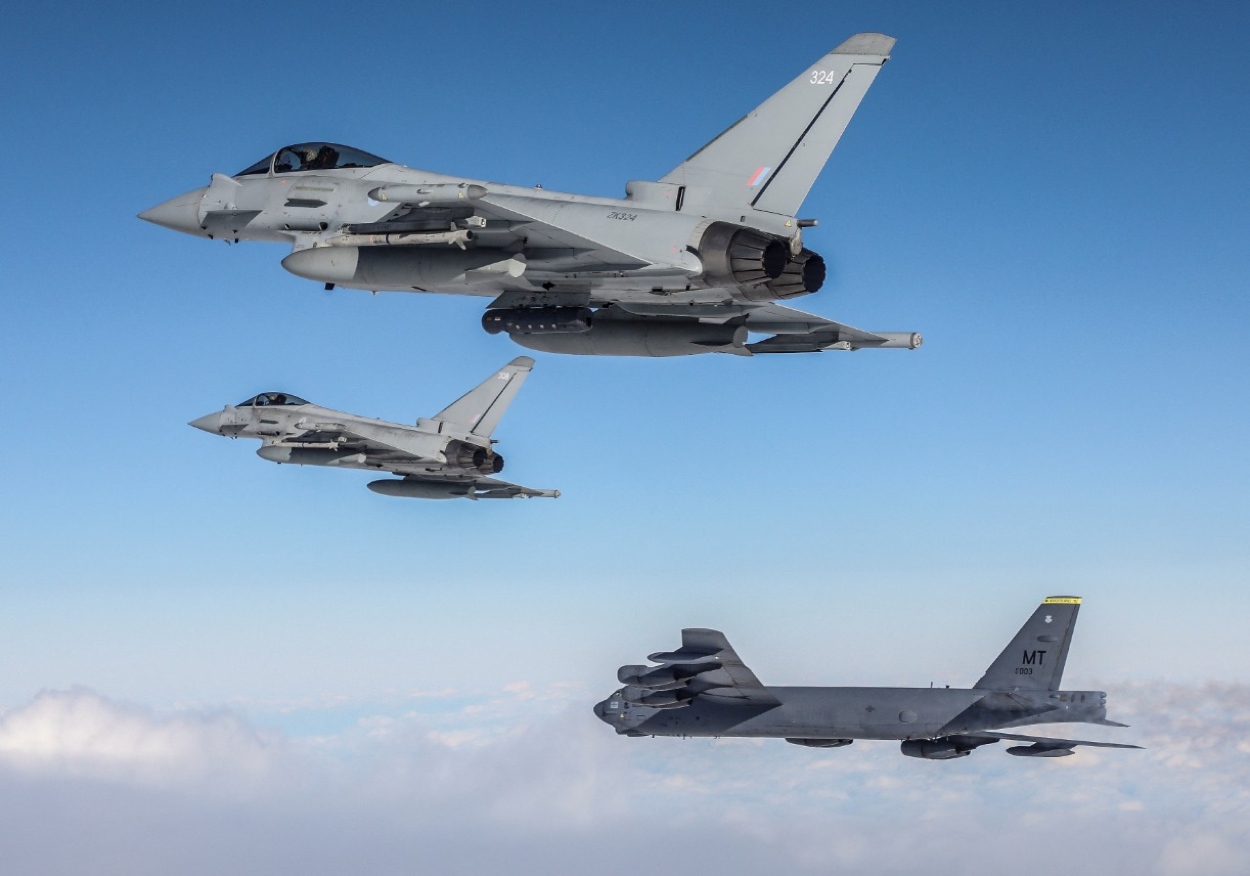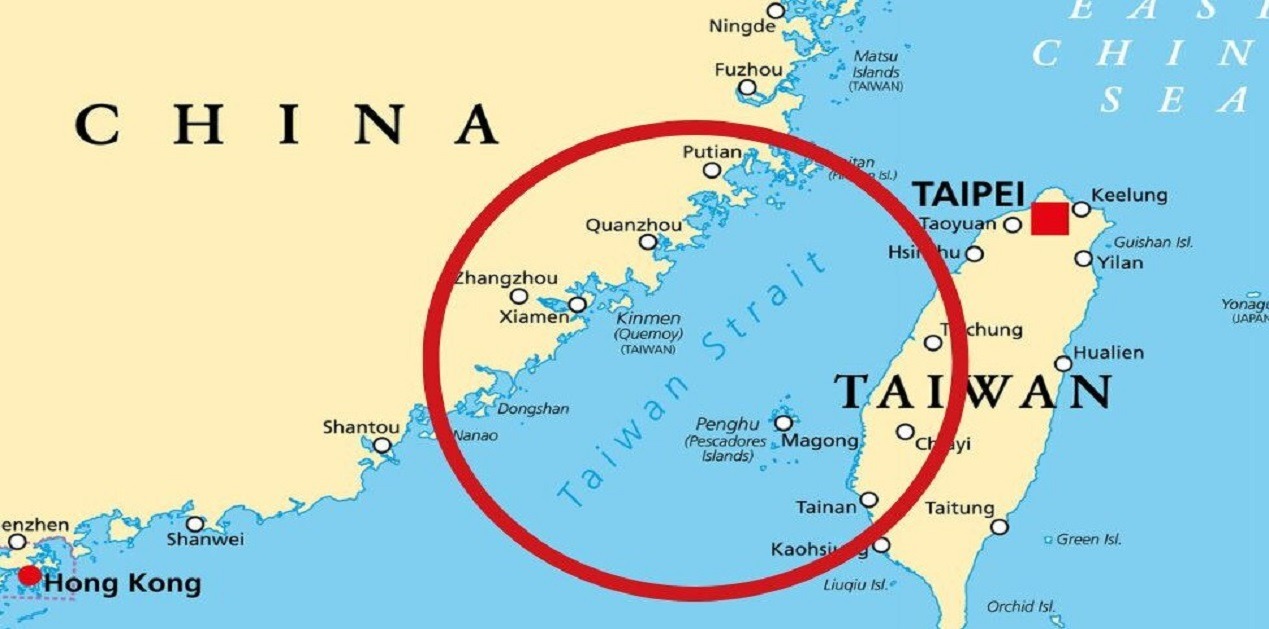If anything, the transit of two German naval vessels—the frigate Baden-Wuerttemberg and the replenishment ship Frankfurt am Main—en route from South Korea to the Philippines through the Taiwan Strait last weekend reflects Berlin’s determination to engage actively in the Indo-Pacific in defiance of China’s warning.
It is increasingly becoming apparent that Germany is very much a part of NATO’s understanding that China’s role in supporting the Russian war effort in Ukraine has made transatlantic security inseparable from that of the Indo-Pacific.
In the process, Chancellor Olaf Scholz’s government seems to have overlooked the domestic criticisms from certain quarters that Germany should essentially concentrate on the Euro-Atlantic, not overstretch its military resources to the Indo-Pacific, and avoid confrontations with China, the country’s largest trading partner in Asia.
The two ships mentioned above left the South Korean port city of Incheon on Tuesday (September 10) and crossed the Taiwan Strait on Friday (September 13) for the first time in 22 years.
German Defense Minister Boris Pistorius has explained the transit as a normal activity in “international waters” and said that “it is the shortest and, given the weather conditions, also the safest route.”
However, China has viewed the passage differently as an act of hostility. On Saturday (September 14), China’s military criticized the transit as an increase in security risks.
“The German side’s behavior increases security risks and sends the wrong signal,” Chinese military spokesman Li Xi said, adding that troops in the theater are on high alert at all times and will resolutely counter all threats and provocations.
Apparently, Beijing claims the democratically governed Taiwan as its own and says the strait is within Chinese jurisdiction. So much so that during the transit of the German vessels, the Eastern Theater Command of the People’s Liberation Army mobilized its air and naval forces to monitor them.
Chinese publication Global Times has commented that Germany is abandoning its prudent and rational approach of over 20 years by undertaking a move with nothing to gain and everything to lose.
“Does ‘freedom of navigation’ really necessitate choosing a route that is highly sensitive and clearly offends China’s core interest? Both the German government and military are fully aware of the political implications of crossing the Taiwan Straits. They know that, for China, such a move constitutes a provocation. Respecting each other’s core interests and major concerns is essential for a comprehensive strategic partnership. Is today’s Germany about to forsake its previous political maturity? If Germany aims to showcase its military presence in the Asia-Pacific, sending warships through the Taiwan Straits is the most ill-advised approach. This action appears to be primarily a favor for the US, signaling a supportive stance toward the US’ tactics regarding the Taiwan question”.
Of course, it is not the first time that Germany has exercised its right of free navigation in the region around China. On 2 August 2021, the German frigate Bayern set sail for a historic mission to the Indo-Pacific region after 19 long years, calling on the ports of friendly nations (including India) and participating in some bilateral exercises that were called “freedom of navigation operations.”
Besides, the German Air Force deployed 13 military aircraft to the Indo-Pacific region in August 2022, again an operational first. It was called the “Rapid Pacific 2022” operation and aimed to get aircraft to the region within 24 hours.

As part of this, the German Air Force participated in September 2022 in the “Pitch Black” exercises, Australia’s largest air force maneuver, in which 16 other countries, including India, Indonesia, Japan, South Korea, the United States, and France, took part. Following “Pitch Black,” the aircraft units practiced together with the Singapore Air Force and visited Japan and South Korea.
“Rapid Pacific 2022” was said to have unambiguous geostrategic objectives, as the action signaled that Germany could have a rapid military presence in the Indo-Pacific, even in the face of security challenges in Europe owing to Russia’s war in Ukraine.
At the same time, however, Germany had made it clear then that all these activities were not directed against China. Thus, during their presence in the Indo-Pacific, neither the German Navy nor the Air Force crossed the Taiwan Strait.
Germany scrupulously avoided any operation, even in the contested waters of the South China Sea, not to antagonize China.
That time, the Bayern sailed from South Korea to Singapore but did not pass through the highly sensitive Taiwan Strait.
But this time, it has not been so. Taiwan Strait has been crossed.
In fact, the latest navigation by German military vessels in the region is being seen as part of the Indo-Pacific Deployment (IPD) 2024, a set of multinational naval exercises and international operations that began in May and will last until December.
The German Navy has described the IPD as “the most important” security operation this year in light of Russia’s war in Ukraine, which has forced Berlin to reprioritize its defense strategies.
Berlin is said to have stepped up its security role in the Indo-Pacific soon after the NATO summit held in July in Washington, where NATO countries and their Indo-Pacific partners, Australia, Japan, New Zealand, and South Korea, agreed to boost cooperation.

Shortly after the summit, Germany joined the Japanese Air Self-Defense Force in conducting joint aerial drills around Chitose Air Base on the Japanese main island of Hokkaido.
From June to August, the German Air Forces participated in Pacific Skies 24 aerial drills alongside other European countries and Australia, India, Japan and the U.S.
During the same period, the German Navy took part in biannual multinational drills dubbed RIMPAC at the invitation of the U.S. Navy. In August, it joined the U.S.-led U.N. Command in South Korea, becoming the 18th country to support the international body charged with defending against North Korean aggression if a war breaks out.
After the German frigate Baden-Wurttemberg and the replenishment ship Frankfurt am Main arrived in South Korea last fortnight, the frigate held naval drills with South Korean forces and participated in a maritime operation to monitor U.N. sanctions against North Korea.
This implies that Germany is prepared to project its military prowess along with its partners, such as Australia, Japan, South Korea, and the U.S., in the Indo-Pacific.
It may be noted that since 1920, when the German government under Chancellor Angela Merkel framed Germany’s Indo-Pacific policy (France was the first European country to chalk out the Indo-Pacific strategy), which Chancellor Scholz is committed to, Berlin has tried to reduce its economic dependence and supply chains on China.
Germany now sees China as both a competitor and a systemic rival. Reducing Germany’s economic dependence on China is now referred to as “de-risking” in Berlin. It is said to be achieved by diversifying Berlin’s relations, which, in effect, means turning to other partners in the Indo-Pacific.
Germany is said to be attaching great importance to what is called “value-based partnerships.” Chinese “authoritarianism” is now an irritant in German partnerships. Germany values partners who believe in rules-based order, international law, and universal human rights, it is said.
Over the last few years, Germany’s official discourse has displayed a congruence of values and norms. The list of value-based partners in the Indo-Pacific has shown a steady rise; it now includes Australia, India, Indonesia, Japan, Mongolia, New Zealand, Singapore, South Korea, and Taiwan.
For Germany, the Indo-Pacific can only benefit from peace, security, and stability if all countries in the region do their part in equal measure. “Inclusivity” and “equality” in regional cooperation initiatives are now Berlin’s key diplomatic terms for the region.
The above points constitute the rationale that perhaps explains why Germany is actively participating in what the experts call “an emerging diplomatic coalition against China’s hegemony in the Indo-Pacific.”
Its increasing engagement in the region is said to be against attempts to change the territorial status quo and international law, and in pursuing them, Berlin finds itself coming closer to the U.S. and other partners in the Indo-Pacific.
Criticism
However, this policy is not free from increasing criticisms from many quarters within Germany. Two of them are particularly noteworthy.
First, antagonizing China is avoidable when it is not only Germany’s biggest trade partner but also an important market for German investments in the region.
In fact, China is Germany’s third-largest destination for FDI (only behind the United States and Luxembourg), worth almost EUR 103 billion ($101B). As a result, any significant reduction in Germany’s economic exchange with China could harm the German economy.
Secondly, unlike France and Britain, Germany is neither a resident power in the Indo-Pacific nor a part of any formal regional network.
France and the United Kingdom have deeper historical links and overseas territories that shape their respective approaches. Germany, on the other hand, has no territories or military bases in the region.
Therefore, Germany should only identify itself as a continental power focused on Europe, where its main challenges lie, and continue to pursue its long-standing policy of viewing the Indo-Pacific region from a somewhat detached position.
However, Chancellor Scholz does not seem impressed by such criticisms if the passage of the German naval vessels in the Taiwan Strait is any indication.
- Author and veteran journalist Prakash Nanda is Chairman of the Editorial Board – EurAsian Times and has been commenting on politics, foreign policy, on strategic affairs for nearly three decades. A former National Fellow of the Indian Council for Historical Research and recipient of the Seoul Peace Prize Scholarship, he is also a Professor at Reva University, Bangalore.
- VIEWS PERSONAL OF THE AUTHOR
- CONTACT: prakash.nanda (at) hotmail.com
- Follow EurAsian Times on Google News




